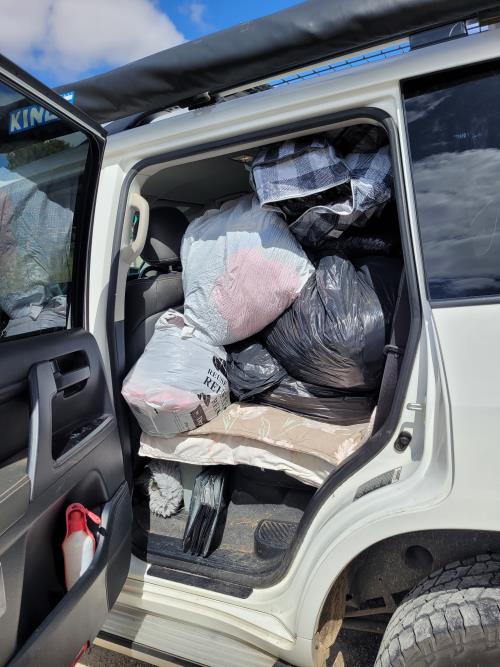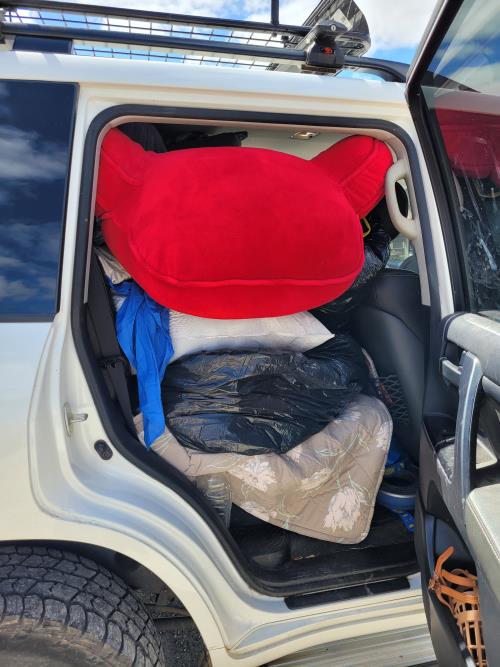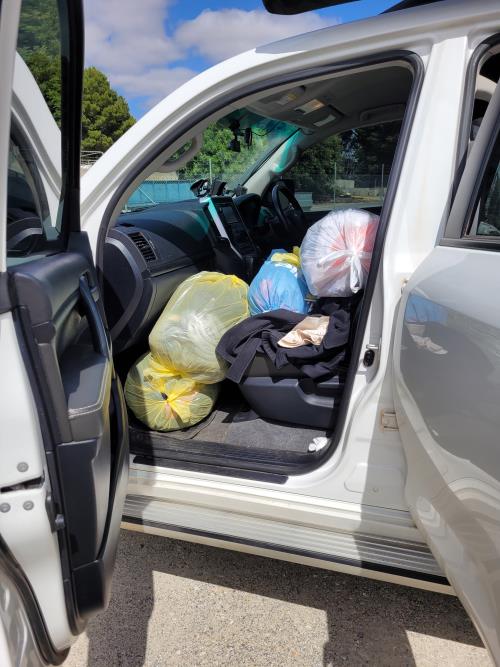I have just completed my two weeks on the clothing bins. For those that don’t know, we have three clothing bins at Nuriootpa, Angaston and Tanunda to allow people to donate clothing to the Great Revival Shop and the Truro Op shop. My job has been emptying the Nuriootpa bin. Two other members have been looking after the Tanunda and Angaston bins. This is the daily load in my Landcruiser.




I have a Landcruiser that gets the back cargo area, the backseat and sometimes the front passenger seat filled with donations almost every day from the Nuriootpa bin. There are signs on the bin asking for good quality used clothing, but unfortunately, many people cannot read and dump all sorts of rubbish in and near the bin. I have taken several items home and put them in my bin this week.
We wear gloves to collect the clothing donations because there have been instances of glass or ceramic items in a bag that is dropped in the bin, the item smashed and we have shards sticking out that will do serious injury to the unwary. We have even had a hypodermic needle in a bag.
The good news is that a lot of the donations are of good quality, they have been laundered, ironed and stacked in bags. The smell of a freshly laundered bag is a relief when we are picking up donations. The whole operation has been going on for much longer than I have been a member of the Barossa Valley Rotary Club with a huge amount of cash returned to the Community through the Clothing Bin system. The Great Revival Shop and the Truro Op Shop give us a percentage of their profits from selling donated clothes. Both outlets use their profits to assist our Community, so every cent that is made from the clothing bins is returned to the community either by us or the Great Revival Shop and the Truro Op Shop.
How much time does it take? I had the Christmas period and was away when I was supposed to start so Bryce did an extra 2 days for me. I started on 24th December with a full load in my Landcruiser. I missed Christmas Day and then emptied the bin on Boxing Day which was a small load, From then on I had the cargo area and the back seat full every day and occasionally the front passenger seat until the end of my shift on the 5th January which included an extra day to help out Peter T.
Each round trip from home to the bin, then to the sorting shed in Tanunda to unload and home again was 20 km. Each trip was about an hour, a bit less for a light load and a bit more for a full load. For my shift, I did 12 hours and 240 km. I believe the Angaston and Tanunda bins are not emptied every day so they may only do 8-10 days a fortnight. The Angaston round trip would be a lot more than the Nuri run and the Tanunda round trip would be a bit less than Nuri. My estimate for the time spent and distance travelled by the three of us, we would have done about 30 hours and travelled about 600 km.
The Christmas period is usually much busier than a “normal” fortnight. If we cut the time and distance by a third (which would be understating the effort put in) then the yearly total becomes 520 hours and 10400 km. This is a conservative estimate as I based the original figures on 1 day short of a 14-day shift and the arbitrary cut of 33% for a “normal” shift is just based on my gut instinct and not on any actual figures.
Some of the things we collect can be interesting. It would seem that there are a lot of unipedal people in the Barossa as the number of single shoes that turn up is amazing. Occasionally, someone will donate a very high-quality item that still has a price tag on it. Clothes made by exclusive designers sometimes appear that are in as-new condition. Some people will be getting a real bargain on those days. Sometimes we get weird and wonderful things that make us wonder how the other half lives. Strange things turn up in the bin that we can not make out exactly what it is or what use it would be. Exotic underwear is not unusual to find, but when it has a leather look and an apparent whip pocket then you can not help thinking that a lady of negotiable affection is upgrading her repertoire.
Sometimes we will get a huge donation of clothes of the same size and a full range from shoes to hats. Shirts, jackets, trousers and suits, are all usually in excellent condition which suggests an entire wardrobe of clothes has been cleaned out and donated to be recycled. The most likely scenario is that the owner had passed on and the family needed to move the clothing on. A sad time for the family, but the clothes will begin a new life and help out someone who needed help.
Why do we do it? We put in a lot of time and money ( 10400km at $2 a litre and 10 l/100 km is a lot of money) but that is not what a Rotarian considers. Being a Rotarian does cost a lot, but the benefit we give to our community is well worth the effort. We have funded Barossan students to University, awarded cash payments to high school students to help them pursue their dreams, sent donations for drought-stricken farmers, assisted many community groups with projects, provided defibrillators to CFS stations and gyms, purchased a shelter for a dog park and contributed to many individuals and groups trying to raise funds for their projects. These are just a few of the projects in the Barossa. Add in the projects for South Australia, Australia and the rest of the world to get the full picture. We currently have a project to improve dental health in Uganda that started as a club project but has expanded multiple times to become a major Rotary project. Every time there is an international disaster Rotary International is there with humanitarian aid such as Shelter Boxes which provide essentials for people made homeless by the disaster.
Just think, all this comes from me emptying a clothing bin and carting it to a sorting shed, plus the Airshow raises some funds, helping out with parking at shows, the odd BBQ and the various things we do to raise funds. We also have a good time with fellowship. Regular meetings include time to chat, and several events for the year are specifically for fellowship. To paraphrase the adage, ‘All work and no play make Rotarians dull people’ and we are not dull people.